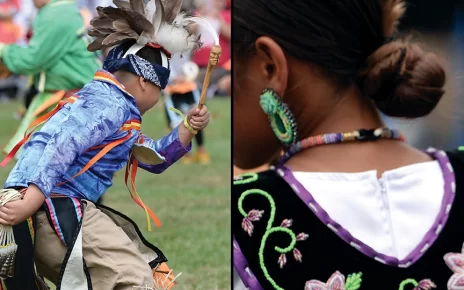December 5, 2022 | By Dr. Rodney Haring | roswellpark.org
Indigenous communities face a greater burden from liver cancer than other populations.
The incidence of chronic liver disease and the mortality rate for liver cancer has increased in the last 10 years among the Haudenosaunee (hoe-dee-no-SHOW-nee), the current day six-tribe Iroquois Confederacy whose Indigenous Peoples connect ancestrally to North America. And, according to a WNY Cancer Snapshot: 2022 report released in September, rates of liver disease and deaths, including cancer, among the Haudenosaunee are higher than in many other communities across New York State.
“What was striking about the WNY Cancer Snapshot data is that, statistically, significant differences were found between Haudenosaunee and non-Hispanic whites for deaths related to chronic liver disease and liver cancer,” says Rodney Haring, PhD, MSW, head of the Center for Indigenous Cancer Research and Services (CICR) at Roswell Park Comprehensive Cancer Center and a member of the Seneca Nation/Beaver Clan. “We’ve had challenges with cancer rates, in some cases when rates in the general population have plateaued or improved while rates among Haudenosaunee continue to grow.”
Many factors drive the disparity
Dr. Haring cites hepatitis and obesity, which often leads to diabetes, as two of three core health determinants that contribute to a greater prevalence of liver disease and liver cancer. “We’ve adopted modern eating habits related to bigger portion size and poorer nutritional choices that include more fast food. The issue of obesity relates to all different types of cancer beyond liver cancer.” However, alcohol use and misuse, he says, is a more serious contributor to disparate liver disease rates among Indigenous communities, not just in Western New York and the rest of the state, but nationally and internationally.
“Alcohol is a challenge in many Indigenous communities around the world. Historically, this ties back to colonization. Alcohol was also used in treaty negotiations, where barrels of rum were, at times, offered after treaty negotiations. Alcohol is not something that’s traditionally part of our culture and was introduced to Indigenous Peoples,” Dr. Haring maintains.
“Across time, historical traumas, which include the boarding schools where Native children were separated from parents and into forced assimilation practices, resulted in the attempted removal of traditions, attempted removal of language and attempted removal of cultural values. Our communities are learning more about the relationship of those traumas to substance abuse and misuse, including alcohol, and about how to recognize the impact of these which have a connection to current social inequities and concerning health determinants — in our communities and within ourselves.”
Tackling the problem
CICR partners with the leadership of regional Indigenous communities to design and mount trauma-informed strategies and communications that provide preventive education on liver disease and promote access to screenings that can mitigate disparate liver cancer rates. It’s an aggressive boots-on-the-ground approach that distributes information to Haudenosaunee residents in Western New York and beyond through newsletters, webinars, blogs, podcasts and one-on-one conversations with tribal leaders and community members to share resources and answer questions.
CICR also engages one of the largest cancer-specific Indigenous patient navigation programs in the United States – a distinction that recently garnered Dr. Haring an invitation to the White House.
In 2020 Roswell Park became the curator of Native CIRCLE, a comprehensive library of Indigenous-focused health education materials and resource database. Native CIRCLE was established in 1997 by the Mayo Clinic. Under the auspices of the Roswell Park CICR, it now offers Native American communities, students and healthcare professionals a virtual repository on liver disease and cancer in addition to the original cancer-focused health and wellness content on culture, diabetes, nutrition, mindfulness, tobacco use and physical activity.
“Our Center for Indigenous Cancer Research is one-of-a-kind in its own way. It’s integrated into the fabric of Roswell Park, and I think we’re innovative in the things that we do,” Dr. Haring says. “When we find a gap in an area, like we find when looking at mortality rates for liver cancer and disease, we can share that information with our Haudenosaunee relatives across the state and across the border into Ontario and Quebec. We have the ability to create research-to-practice, community-based interventions at the lead of our tribal leaders, but it’s really up to our communities to take the information to the next level.” He stresses the mind-body-spirit strength of the Haudenosaunee in facing social inequities, health disparities and environmental challenges.
Dr. Haring also notes that Roswell Park provides support through the Center for Indigenous Cancer Research in keeping with nation-to-nations understanding from treaties created in land trade for the provision of health care and other social supports for Indigenous Nations. “The work we do is understanding that and how to work in that context,” he says. ”We Haudenosaunee are a very strong-minded people. We have the ability to lean on ourselves and our personal strengths, our families and communities when times are challenging. Our ancestors have walked these same trails from the beginning of time. We’ve been faced with all these traumas and challenges, environmental and societal, and we are still here. Our dances and songs are still occurring. That’s the strength in Indigenous wisdom and resiliency of our people.”
Dr. Rodney Haring (Seneca, Beaver Clan), Ph.D., MSW, is the Center for Indigenous Cancer Research Director at Roswell Park Comprehensive Cancer Center out of Buffalo. Dr. Haring has been working with his team at Roswell Park to provide health assessments, cancer screenings, and prevention tools and educate the Haudenosaunee tribal members about cancer risk factors.




